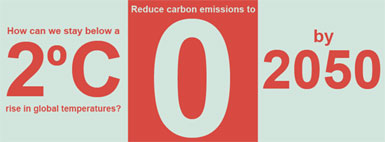In 2013, Sir Richard Branson launched the B Team, saying it’s time for business to be a "force for good."
Now, the group of progressive business leaders is calling for world leaders to commit to net-zero greenhouse gas emissions by 2050 – and urged corporations to match the goal in their own long-term targets.
B Team leaders include Paul Polman, CEO of Unilever; Ratan Tata, Chair of Tata Group; Mo Ibrahim, founder of Celtel; Guilherme Leal, co-founder of Natura; Francois-Henri Pinault, Chair of Kering; Arianna Huffington, CEO of Huffington Post and Jochen Zeitz, former CEO of Puma.
They are following up on the breakthrough that happened during December’s Lima Climate Summit, where over 100 countries adopted the target.

By reaching a global agreement, "governments will demonstrate they are unequivocally setting the world on a clear, low-carbon trajectory. Businesses will respond by embedding bold climate action into their strategies – unleashing innovation, driving investment in clean energy, scaling-up low carbons solutions, creating jobs and supporting economic growth," says B Team.
Reaching this goal by 2100 only gives the world a 66% chance of limiting global warming to 2°C, according to the Intergovernmental Panel on Climate Change (IPCC), but that’s worth the shot, and strengthens the business case for achieving net-zero GHG emissions by 2050, they say.
The B Team calls for:
- Governments to commit to a global goal of net-zero greenhouse gas emissions by 2050, and to embed this in the agreement to be signed at COP21 in Paris.
- For businesses to match this ambition by committing to long-term targets and driving low-carbon solutions to scale – thereby enabling the world to achieve the net-zero 2050 target.
- Businesses and governments to adopt meaningful, effective carbon prices.
- Governments to end all fossil fuel subsidies, and to shift this capital to help scale affordable renewable energy solutions to enable a wider economic transformation.
- Businesses and governments to ensure the benefits of responses to climate change flow to vulnerable and impoverished communities that suffer disproportionately from climate change and are least equipped to cope with its impacts.
They note that businesses are already incurring the costs of climate change, with increasing supply-chain disruptions from extreme weather events, rising sea levels and ocean acidification, falling crop yields and increasing desertification. At the same time, the world’s poorest and most vulnerable – who are disproportionately affected and least equipped to cope – are being hit the hardest.
They also say "as business leaders they view the transition to a net-zero GHG emissions economy as an historic opportunity that, if managed responsibly, fairly and collaboratively, can bring economic benefits to countries at all levels of income, including new jobs, cleaner air, better health, lower poverty and greater energy security."
Businesses must join forces with governments to help drive the transition, by setting clear national targets and developing enabling policies to shift capital toward carbon-free alternatives, to help drive sustainable, inclusive prosperity for all, they say.
The B Team promises to champion "a new way of doing business that prioritizes people and planet alongside profit – a "Plan B" for businesses the world over." "Plan A – where companies have been driven by the profit motive alone – is no longer acceptable."

